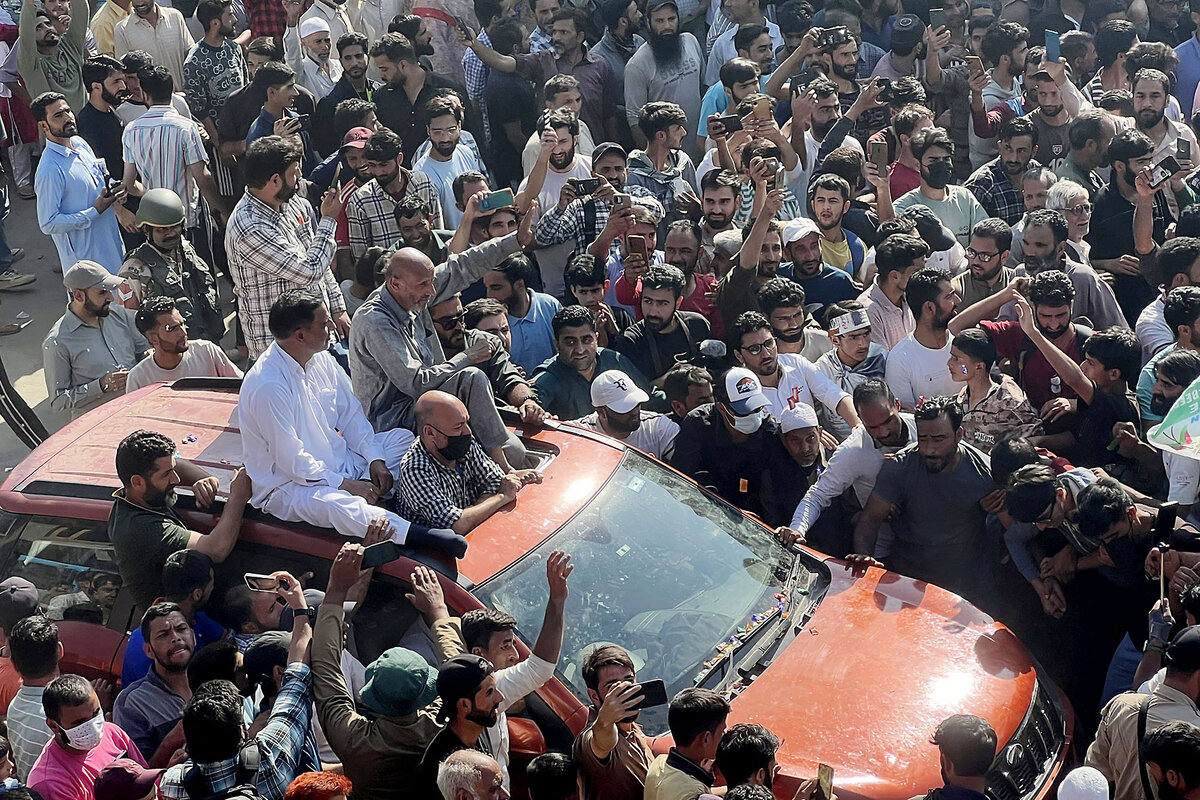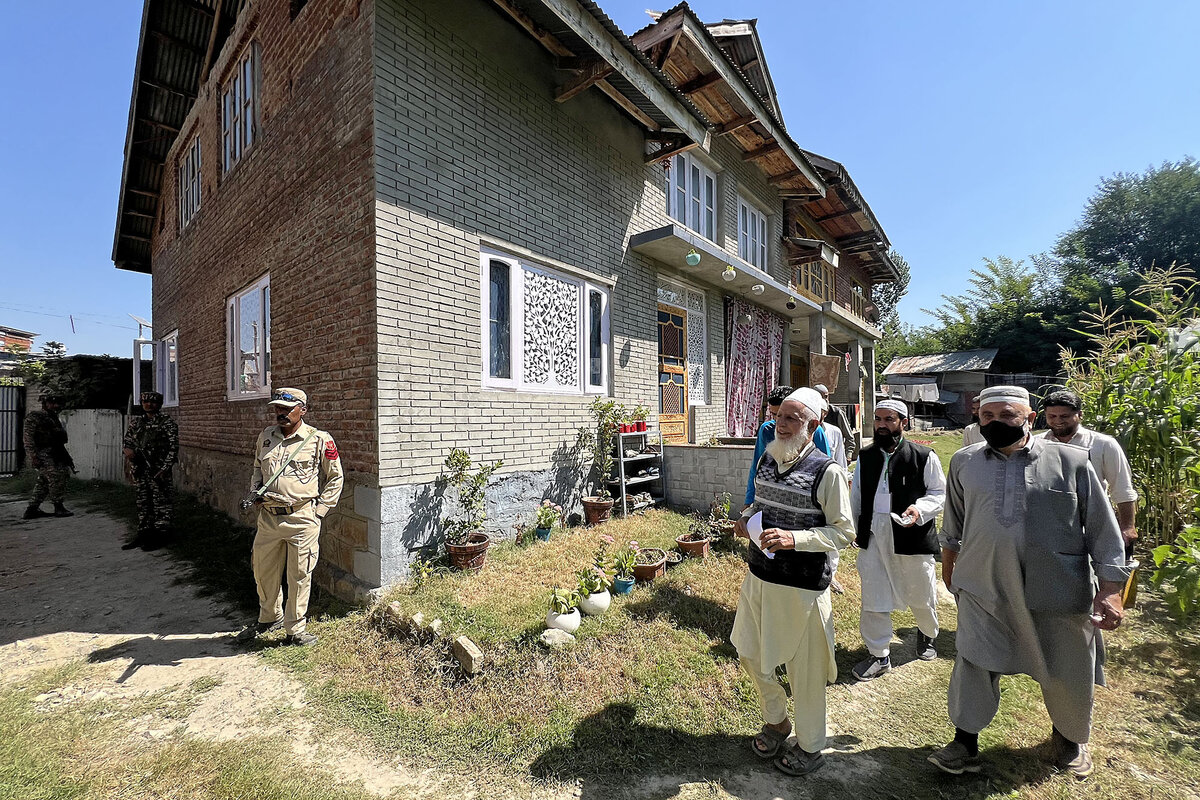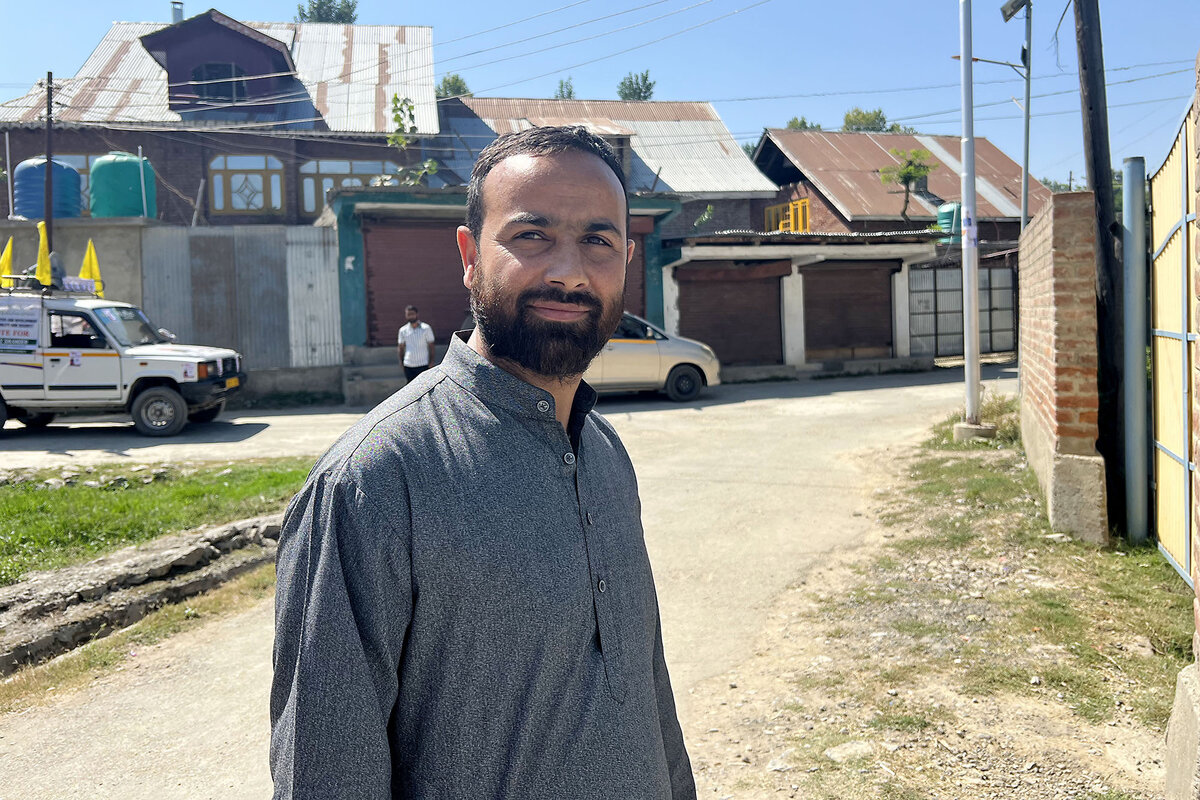Street vendor Javaid Ahmed Bhat has never voted in local elections. Now, he feels it’s imperative.
Jammu and Kashmir – the contested, north Indian territory he calls home – is facing myriad problems, most stemming from the armed insurgency that erupted here in the late 1980s. Over the past five years, India’s central government has stripped Kashmir of its statehood, delayed local elections, expanded its military presence, and jailed critics of the ruling Bharatiya Janata Party (BJP), all in the name of securing peace in the region.
Kashmir’s highly anticipated legislative assembly elections run from Sept. 18 to Oct. 1, with results expected next week. They mark residents’ first shot to regain some semblance of local autonomy.
Although early data from the first two voting phases suggest turnout has remained relatively static compared to the last assembly elections in 2014, the mood on the ground is markedly different. Gone are the calls to boycott elections and the looming terrorist threats which once deterred people from the polls, and many Kashmiris are feeling energized by a wave of 346 independent candidates challenging the region’s traditional parties.
Rashid Wani, a businessman from south Kashmir, says the past five years have left many Kashmiris desperate to express their anger. “People are participating in elections [and] joining rallies,” he says. “These votes are against the BJP.”
Mr. Bhat agrees. The days of anti-India street protests are over, he says, and now “we have to vote.”
Delhi draws a redline
The Kashmir conflict is a territorial dispute rooted in India-Pakistan tensions, as well as the fact that the Muslim-majority region was never allowed to decide whether it wanted to remain with India, join Pakistan, or become independent. It has claimed more than 100,000 lives since 1988, when the armed struggle began.
In August 2019, Prime Minister Narendra Modi and his BJP government downgraded the semi-autonomous state to a union territory, ruled directly by New Delhi, and then imposed a six-month communications blackout to contain the ensuing chaos. Indian officials have been broadly criticized for using sweeping new security laws to jail hundreds of activists, journalists, and politicians in the years since. Any group that fundamentally opposed Indian rule in Kashmir has also been banned.
“Today, we are trying to, in a sense, completely depoliticize the population,” says Ajai Sahni, founder and executive director of the New Delhi-based Institute for Conflict Management. “We are trying to undermine the traditional leadership over there.”
The BJP claims that peace and stability have now returned, but Mr. Sahni nuances that description, describing the armed movement as “very substantially contained.”
Data from his organization shows that dozens have been killed during at least 137 terrorism-related incidents this year, including gunfights and assassinations. Experts also note that the violence appears to be spreading from the Kashmir valley into the historically calmer region of Jammu.
Still, if Pakistan continues to weaken while Delhi maintains its military presence in Kashmir, Mr. Sahni doesn’t expect a resurgence in terrorism, and Delhi’s aggressive crackdown has certainly helped dismantle the network of separatist militants. But as long as separatist ideologies persist, the region remains vulnerable to political unrest.
That’s why, experts posit, Delhi has drawn a clear redline in local politics: No more separatism.
“You can’t question [India’s] sovereignty or try to incite people against the country,” says a senior Indian security officer, who wished to remain anonymous as he was not authorized to speak to the press. “Anyone who crosses this line will have to be dealt with through law enforcement.”
Candidates and parties that once were sympathetic to separatism are now focusing instead on issues like improving the economy, fostering peace with neighboring Pakistan, and addressing Delhi’s mass imprisonments.
Politicking from prison
Hafiz Sikander Malik, an independent candidate in northern Kashmir’s Bandipora district, has spent several years in prison for promoting Kashmiri independence. Now, he’s going door-to-door wearing a GPS ankle monitor, advocating for the release of fellow prisoners and trying to secure a spot in Kashmir’s 90-member legislative assembly.
“Most of our supporters are victims of prison,” says Mr. Malik, who is backed by a banned socioreligious organization that previously boycotted elections. “We want these draconian laws to be revoked. We want to get youth released from prisons. This is part of our manifesto.”
Shopkeeper Malik Nayeem ul Hassan believes a vote for Mr. Malik is a vote against “against oppression and coercion.”
He says many of Mr. Malik’s backers probably boycotted elections in the past, but times have changed. “If we don’t join that change, then we will stay behind in society,” says Mr. Hassan. “It is the need of the hour for everyone to participate in the elections.”
Sheikh Abdul Rashid, better known as “Engineer Rashid,” is also politicking on bail. Since his Sept. 11 release from Tihar prison, where he’s facing terror funding charges, Mr. Rashid has been campaigning on behalf of 34 assembly candidates who oppose Delhi’s crackdown.
The politician made headlines during India’s general election this spring when he won a parliament seat from prison, but his subsequent bail has sparked accusations that he has tacit support from the BJP, which benefits from a fragmented opposition. These allegations have sowed doubt into his base, including Mr. Bhat, the street vendor, who voted for Mr. Rashid in May.
“Rashid talks about the right to self-determination, but it’s all theatrics for elections,” he says.
And compared to the general election, when electing Engineer Rashid was seen as a bold statement against Mr. Modi and the BJP, Mr. Bhat says voters must now think more practically. How much can an assembly member really accomplish behind bars, or while out on bail?
When his district went to the polls on Sept. 25, Mr. Bhat cast his ballot instead for a candidate backed by Kashmir’s oldest party – Jammu and Kashmir National Conference – which has never allied with the BJP in regional elections, and poses the strongest threat to Delhi’s influence.









